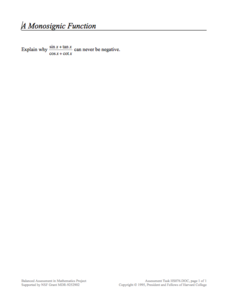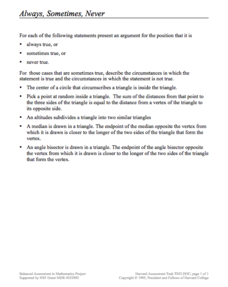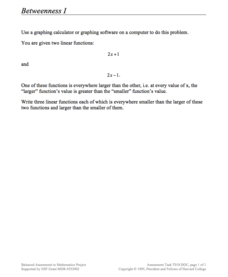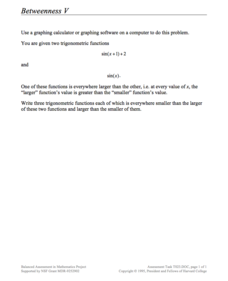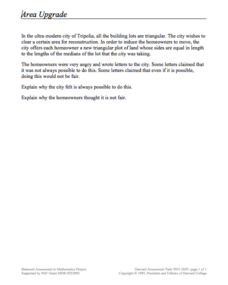Balanced Assessment
L to Scale
Explore the meaning of scale in relation to actual size through this activity. Young mathematicians examine scale models and determine their relationship to each other. They also find perimeter and area of each model.
Balanced Assessment
Scaling the Stars
Examine ratio and scale through coordinate geometry. Scholars use two diagrams of different scale to calculate perimeter and area. Then, individuals use the perimeters and areas to find ratios.
Balanced Assessment
Multi-Figures
Apply concepts of scale and ratio to determine relationships in irregular figures. Learners determine the ratio of the perimeters of two figures composed of rectangles and circles. After, they apply similar concepts to find the ratio of...
Balanced Assessment
Transformation II
Develop a solid understanding of the manipulation of expressions to produce equivalent expressions. Given an expression, pupils rearrange it to create a new one. Their new functions must match the structure of the model expressions.
Balanced Assessment
Bumpy-Ness
Develop a new measure of the properties of an object. Scholars develop a definition and formula to measure the bumpy-ness of an object. They utilize their formulas to find the property for several spherical objects.
Balanced Assessment
Mirror, Mirror II
Apply the concept of similar triangles to design a space in a room. Scholars use similar triangles to determine how a spotlight reflects from a mirror. After drawing the path of the spotlight, individuals find the smallest possible width...
Balanced Assessment
Fermi Estimates II
How many hot dogs does Fenway Park go through in a year? Learners estimate answers to this question and more as they work through the task. Problems require participants to make assumptions and use those assumptions to make estimations.
Balanced Assessment
Compact-Ness
Creating a definition may be easier than it sounds! Give your classes experience creating their own definition. Scholars examine the meaning of the compact-ness of a scatter plot and create their own definitions based on measurements.
Balanced Assessment
Bicycle Chain II
Apply geometric concepts to a design problem. Individuals examine the structural setup of the chain on a bicycle and use the measurements of the circles to determine the length of the chain.
Balanced Assessment
Blirts and Gorks
Start a trend by using blirts and gorks as your standard unit of measures. The activity asks learners to take a known measures of blirts and gorks and develop a conversion ratio. Individuals use both perimeter and area measures of...
Balanced Assessment
The Triskaidecaphobia Conference
Triskaidecaphobia is an extreme superstition to the number 13—and ironically the answer to the word problem is 13! Presented with a series of descriptive data, individuals analyze the data to determine the population size. They must...
Balanced Assessment
Cost of Living
Math scholars investigate the cost of living in Hong Kong compared to Chicago but must first convert the different types of currency. They then choose a type of graph to compare different spending categories and finish the activity by...
Balanced Assessment
Fermi Estimates I
Enrico Fermi, the physicist responsible for the first nuclear detonation, was known for his ability to estimate with little or no data. Use this task to have your classes practice their Fermi skills. They estimate the magnitude of three...
Concord Consortium
A Monosignic Function
Complex fractions and trigonometric expressions combine to create a challenging task ... as if they aren't challenging enough on their own! The task challenges individuals to consider the range of possible values when substituting in the...
Concord Consortium
Always, Sometimes, Never
Do your learners always, sometimes, or never remember the properties of the segments in triangles? Get that number closer to always with a creative lesson analyzing all four segments. Scholars consider a statement about one of the...
Concord Consortium
Betweenness I
Just between us, this is a pretty cool lesson! Given two functions with the same slope, learners write three new functions whose outputs are all between the given functions. The question is open-ended, allowing pupils to explore the...
Concord Consortium
Betweenness II
Read between the curves ... quadratic curves! Young scholars analyze the graphs of two quadratic functions by writing their own function whose outputs are between the two given. They then consider intersecting quadratic functions and...
Concord Consortium
Betweenness III
Don't let a little challenge get between your pupils and their learning! Scholars compare two absolute value functions to recognize patterns and use them to build their own functions with outputs that are between the given. They then...
Concord Consortium
Betweenness IV
Challenge your classes to think between the curves. Given two function formed by the combination of two exponential functions, individuals must write three functions in which all values would lie between the given. The question is...
Concord Consortium
Betweenness V
Take a unique approach to study the graphing of trigonometric functions. Young scholars consider two sine functions and write three functions that will lie between the two given. They use a graphing utility to assist in their explorations.
Concord Consortium
Area Upgrade
Imagine a world built of triangles. A performance task asks scholars to consider just that. They use their knowledge of special segments of a triangle to make decisions about the area of triangular plots of land.
Concord Consortium
An Algebraic Oversight
Tackle a common misconception using a performance task. Dividing by a variable to eliminate a variable may seem like a good idea, but simplifying the variable eliminates solutions as well. Learners develop algebraic and graphical support...
Concord Consortium
Adding the Sines
It's a sign! Scholars analyze sine functions for patterns in their periods. The exploration advances beyond a simple function to the combination of two functions with even and odd coefficients. Their goal is to find a pattern between the...
Concord Consortium
Acid Test
This isn't your typical basic lesson—it's more acidic! Learners use pH information to determine the hydroxide ion concentration of different substances and then use these values to analyze information. The calculations require...
Other popular searches
- Arabic Poetry
- Arabic Calligraphy
- Arabic Influence
- Multicultural Music Arabic
- Arabic Numbers
- Arabic Language
- Arabic Numerals
- Arabic Architecture
- Arabic Influence in Spain
- Arabic Foods
- Arabic Poetry for Teachers
- Arabic Poetry for Students















